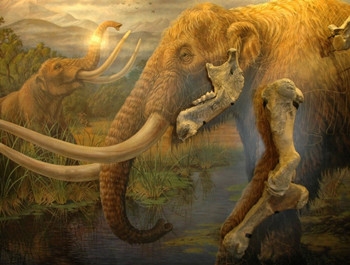(单词翻译:单击)

Some of this ice age dung was found beneath the skull in the Aucilla. The dung contained plant remains that tell us what the mastodon was browsing on 13,000 years ago or more—a mixture of trees and grasses.
在奥西拉市发现的头骨下面发现了一些从冰河时代遗留下来的粪便。粪便中包含着植物化石,这告诉我们,在13000多年前,乳齿象的食物便是树木和草的混合物。
This suggests that ice age Florida was drier than it is today—a mix of woodlands and savanna rather than swamps. And mastodon teeth found in the Aucilla held a more important revelation. The enamel contains chemical signatures of a local soil, passed by the plants the mastodons ate. But some of the chemicals found in the Aucilla teeth could only have come from soil hundreds of miles further north. The inescapable conclusion is that these mastodons migrated, making a round trip of more than 400 miles every year. And since their dung also contains remains of summer fruits from the Aucilla region, they must have travelled north for the winter.
这能够告诉我们,冰河时代的佛罗里达比现在更加干燥,到处都是树林和草原而不是沼泽。在奥西拉发现的乳齿象的牙齿透漏出了更多的重要信息。通过他们所吃的食物,牙齿上的釉质带有一些当地土壤的化学成分。但是,一些牙齿上的化学成分都来于北方几百英里外的土壤。我们很轻易地得出一个结论:这些乳齿象每年都进行400多英里的往返迁移。由于这些粪便中含有来自奥西拉地区的夏季水果化石,因此他们一定是在冬天向北方迁徙。
The question is, why? Why leave a place which as we have seen was abundant with food and a refuge from the cold? And why go north for the winter when most migrants move south? Perhaps the present climate can provide a clue.
问题是,这是为什么呢?为什么离开一个在我们看来食物充足并能抵御严寒的地方?为什么当大部分的动物向南部迁徙过冬时他们却向北部迁徙?也许现在的气候可以为我们提供一些线索。
Florida has a peculiar seasonal quirk. Although the winter months are cooler, they are also drier, much drier. Between October and February, there's almost no rainfall at all.
佛罗里达的气候十分特殊。尽管冬季的月份更加寒冷,但是同样也更加干燥,尤为干燥。在十月和二月之间,佛罗里达基本上没有降雨。
英文文本来自普特英语,译文属可可原创,仅供学习交流使用,未经许可不得转载。


